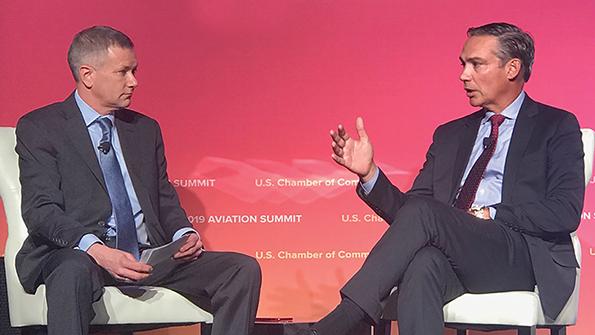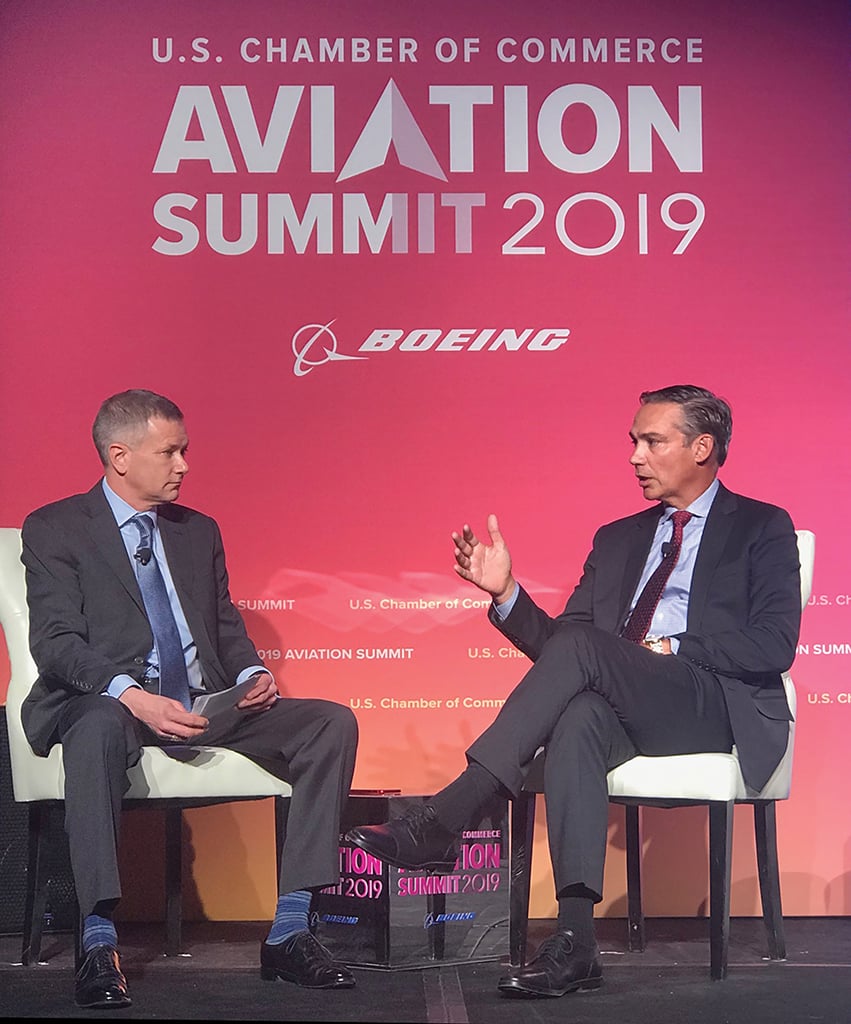
United Technologies Corp.’s newly minted aerospace super supplier, Collins Aerospace, combines the legacy operations of Rockwell Collins, B/E Aerospace, Hamilton Sundstrand and Goodrich. Editor-in-Chief Joe Anselmo interviewed CEO Kelly Ortberg onstage at the U.S. Chamber of Commerce’s recent Aviation Summit in Washington to talk about the new company and its push into hybrid-electric propulsion and connected aerospace.
How is the integration coming along?
Very well. The 14 months it took to complete the regulatory process allowed us to get all the planning and people in place. Once we closed the merger everyone knew where they were going to be, so we hit the ground running. We formulated the integration to focus on the three Cs: customers, collaboration and change. We have a lot of legacy businesses we’re bringing together into an organization of roughly 70,000 people. I’ve said to all our employees that it is not about migrating everybody’s culture but creating a new culture. We tried to create an organizational structure that delegates responsibilities as low in the organization as we can. We empower our people to get away from what is viewed as slow and corporate mentalities.
We’ve heard some dismal statistics about looming shortfalls of pilots and technical workers. Are there any technologies out there, such as automation or AI, that could play a role in helping address the problem? You hear a lot about it because we need to get out in front of it, and I think we will. Automation and artificial intelligence {AI] will help along the way, but there is a big mountain to climb to replace our current workforce and hire that next generation. We must continue to reach children at an earlier age. We’ve done a lot of studies and followed the kids. A higher number will go into science, technology, engineering and mathematics-related jobs if you can help them understand at nine years or even younger that STEM-related jobs are not only fun, but that they’re capable of doing them.
Was United Technologies’ acquisition of Rockwell Collins and the creation of Collins Aerospace the result of having to achieve heft to address increased vertical integration by Boeing and other OEMs? That could not be further from the truth. Yes, there is vertical integration. I think all the OEMs are revisiting the value they bring versus the value they buy. Boeing has announced some areas they are planning to vertically integrate that are in [our] spaces. But this is a very big market with lots of opportunities. We are not going to fight it; we are going to work around it. As they vertically integrate, if they want to work in a space, then we’ll go work in a different space. There is still a lot of need for companies like us.
This industry is hitting on all cylinders. Are there any clouds on the horizon? Not that I can see. I think the biggest challenge is managing growth in the end markets. We have all been strained for the past year and there are still [commercial aircraft] rate increases coming, so we just have to stay focused. If I look back three years, none of us would have believed we would achieve the rates we have. I think we were probably collectively slow as an industry to make the capital investments to be ready for that. So we are in a bit of a catch-up mode.
What drivers of change will redefine this industry in the next decade? Hybrid-electric propulsion is huge. We’ve invested nearly $3 billion in power generation and distribution, and we will be breaking ground on a new lab in Rockford, Illinois, where we will be testing some of the latest technologies in hybrid-electric propulsion. I do not know how it is all going to play out, but I do know that power generation and distribution is going to be really important. The connected aerospace ecosystem—it’s more than a connected airplane—is really important, and we are just at the very beginning. Modern airplanes connect things, but we are producing a tremendous amount of data which we really are not utilizing in a way that delivers value to the end customers. There is much more we can do. We are still at the very early stages of this market transformation.






